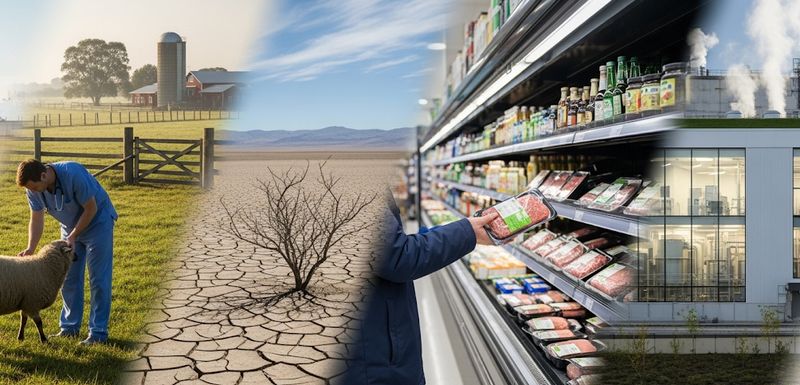
Market Pulse: Eastern Europe Drought Hits Feed Supply, UK-EU Trade Deal Welcomed, and Vion Restructures in Germany
Insights on Eastern Europe's feed crisis, a new UK-EU trade agreement, and Vion's major restructuring in the German beef market.
Eastern Europe: Drought Cuts EU Maize Yield Forecast, Threatening Feed Supplies
What happened: The EU's crop monitoring unit (MARS) has downgraded its 2025 maize yield forecast after severe drought and heatwaves caused irreversible damage to crops in key Eastern European countries, including Romania, Bulgaria, and Hungary. The revised forecast is now 2% below the five-year average, raising concerns about the availability and cost of animal feed.
Why it matters: Maize is a cornerstone of animal feed formulations for the pig and poultry sectors. A reduced harvest in this major growing region will inevitably tighten supply across the EU, leading to higher input costs for livestock producers. This adds another layer of financial pressure on farmers already dealing with inflation and other market volatilities.
Implications & suggested actions:
Livestock Producers: Proactively explore alternative feed components and sourcing options to mitigate the impact of rising maize prices. Consider locking in feed contracts now to safeguard against future price hikes.
Feed Suppliers: Maintain transparent communication with clients regarding the supply situation. Offer expertise and guidance on reformulating rations to manage costs effectively without compromising animal performance.
Processors & Retailers: Prepare for the likelihood that increased production costs will translate to higher wholesale and retail meat prices. Work closely with your supply chain partners to understand and manage these cost pressures.
UK Market: Dunbia Welcomes New Streamlined UK-EU SPS Agreement
What happened: UK meat processor Dunbia has met with the Food Security Minister to welcome the government's new Sanitary and Phytosanitary (SPS) agreement with the European Union. The new deal aims to simplify and reduce the complexity of border checks for agri-food products, making trade "cheaper and easier."
Why it matters: Post-Brexit trade friction has added significant cost and administrative burden to the UK meat industry. A more streamlined SPS agreement is a crucial step towards reducing these burdens, potentially improving the competitiveness of UK meat exports to the EU and simplifying the import of necessary goods.
Implications & suggested actions:
Exporters: Familiarise yourselves with the new, simplified procedures to ensure you can fully leverage the benefits of reduced checks and paperwork. This should help improve the speed and reduce the cost of sending products to the EU.
Importers: The eased border controls should also apply to imports from the EU, potentially leading to a more stable and cost-effective supply of goods.
Logistics & Haulage Companies: Stay updated on the implementation of the new border model to advise clients accurately and optimise transport schedules for greater efficiency.
European Market: Vion Reorganises German Beef Division to Boost Efficiency
What happened: Major European processor Vion Food Group has announced a significant reorganisation of its German beef operations. The plan involves closing its Altenburg facility and investing to transform its Buchloe and Perleberg sites into specialised "beef competence centres" for southern and northern Germany, respectively.
Why it matters: This move reflects a broader trend of consolidation and specialisation within the European meat processing sector. By concentrating resources into dedicated, highly efficient facilities, Vion aims to strengthen its supply chain, improve its market position, and respond to what it calls a "structurally declining" market. This signals a strategic shift from volume to value and efficiency.
Implications & suggested actions:
Processors: Evaluate your own operational footprint. This move by a major player like Vion highlights the growing importance of efficiency, specialisation, and supply chain optimisation to remain competitive.
Livestock Suppliers: Be aware of these shifts in the processing landscape. Suppliers to the closing Altenburg site will need to find new buyers, while those near the expanding Buchloe and Perleberg facilities may see new opportunities.
Competitors: Vion's investment in specialised beef centres will likely increase its competitive strength in the German market. Competitors should anticipate a more efficient and focused rival and assess their own strategic responses.
Sources:
